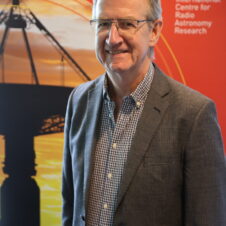Next step for the SKA
Nine national governmental and research organisations have this week established a Founding Board for the global Square Kilometre Array (SKA) project. Australia, China, France, Germany, Italy, the Netherlands, New Zealand, South Africa, and the UK signed a Letter of Intent in Rome, declaring their common ambition to see the SKA built, and agreed to work together to secure funding for the next phase of the SKA project. The new Board has announced that the SKA Project Office (SPO) will be based at the Jodrell Bank Observatory near Manchester in the United Kingdom. This new management structure will guide the project into the next phase of development.
The SKA is a AU$3 billion global science project to build the world’s largest and most sensitive radio telescope. The SKA will be capable of answering some of the most fundamental questions about the Universe.
The signatory parties represent organisations of national scale and will coordinate groups carrying out SKA research and development work in their respective countries. Further signatories are expected to come forward in the next six months.

The SKA will be the world’s largest radio telescope and will operate day and night searching the hidden Universe. Credit: SPDO and Swinburne Astronomy Productions.
Professor John Womersley, chair of the Founding Board, said: “Given the current economic environment, it is reassuring that so many partners have recognised the importance of supporting the SKA. Our partners have taken this step not only because of the inspirational nature of the discoveries that the SKA will make, but also because of the economic benefits that international megascience projects can bring to participating countries.”
The SPO, which is hoped to grow to 60 people over the next four years, will supersede the existing SKA Program Development Office (SPDO) currently based at the University of Manchester. The move to Jodrell Bank Observatory is scheduled for 1 January 2012.
Professor Richard Schilizzi, Director of the SKA, says: “The move to Jodrell Bank Observatory comes at a crucial time as the project grows from a concept to an international mega-science project. The new location and facilities will support the significant expansion that is planned.”
The decision on the location of the SPO follows a competitive bidding process in which a number of excellent proposals were received, and was announced by the SKA Founding Board following an international review process.
The SKA project will drive technology development in antennas, fibre networks, signal processing, and software and computing. Spin off innovations in these areas will benefit other systems that process large volumes of data. The design, construction and operation of the SKA has the potential to impact skills development in science, engineering and in associated industries not only in the host countries but in all project partners.
The SKA telescope itself will be located in either Australia–New Zealand or Southern Africa. A decision on the location of the SKA telescope will be made in 2012.
From: SKA website.

